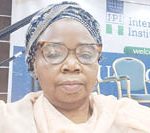Nothing underscores the dynamics of politics better than the meteoric rise of the Labour Party (LP) governorship candidate, Mr. Gbadebo Rhodes-Vivour, in the race for the soul of Lagos State, the Centre of Excellence and the city of aquatic splendor.
Lagos is now the cynosure of all eyes as the country gears up for the next set of elections to choose governors in 28 states and members of the House of Assembly in the 36 states of the federation.
The outcome of the February 25 Presidential election where the Labour Party defeated the ruling All Progressives Congress (APC) in the state suddenly changed the permutation and the Obidient Movement incredibly catapulted the LP Governorship candidate into prominence and altered the permutations of the election.
The defeat of APC in the homestead of the President-Elect, Asiwaju Bola Ahmed Tinubu was one of the upsets and shockers of the February 25 President and National Assembly elections which has triggered apprehension and fear in the minds of the APC supporters.
Violence: 7 states to watch ahead of gov’ship polls
Ex-Ambode Commissioner, others escape bullets during LP campaign rally in Epe
Suddenly, Rhodes-Vivour who was regarded as a little fry compared to Abdul-Azeez Olajide Adediran popularly known as Jandor of the Peoples Democratic Party (PDP) became the number one threat to APC’s retention of power in the state.
Many APC diehard supporters, chieftains and admirers of Tinubu cannot imagine losing the state after fulfilling the ‘life-long ambition’ of their principal for the presidency. This is why there is uneasy calm in the camp. There is fear. There is anxiety and the centre can no longer hold. The governor and all members of the party have upped their game, intensified the campaigns, and ramped up consultations to avoid a repeat of the February 25 when the Obidient movement caused a major upset they are yet to recover from.
IS RHODES-VIVOUR THE MAN TO UPSTAGE THE DYNASTY?
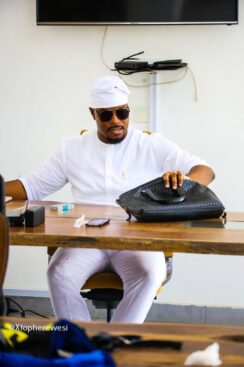
Gbadebo Rhodes-Vivour or GRV as fondly called or ‘Chinedu’ (which has been ascribed to him in the current campaign) is not new to politics in the state. At different times, he has aspired to be chairman, Senator and ultimately the number one man in the state. On July 22, 2016, he contested Ikeja Local Government Chairmanship election under KOWA Party but lost. The following year, he joined the PDP and emerged the party’s Senatorial candidate for Lagos West.
In the build-up to the 2023 election, he was one of the governorship aspirants of the PDP who stepped down for Jandor. Daily Trust learnt that he stepped down for Jandor on the agreement that he would be the running mate but Jandor preferred Ms. Funke Akindele, popular Nollywood Actress.
In protest, GRV joined the Labour Party where he contested for the governorship primary and eventually won, thus emerging the party’s flagbearer for Saturday’s election. GRV who clocked 40 on March 8 is among the youngest set of the candidates contesting the forthcoming elections.
An architect by profession, Gbadebo has by virtue of the Obidient movement become the face of the age-long struggle by the opposition to take over the state, eclipsing Jandor who started early enough through his Lagos4Lagos Movement and embarked on street-walk campaign across the 246 wards in the state since the electioneering started.
But no sooner than the Presidential election ended and the APC defeated in Lagos by the ‘Obidient’ LP, the battle shifted to the governorship with the hope of repeating the same feat. In what was termed as a subtle endorsement of Gbadebo, a former Deputy National Chairman of PDP, Chief Bode George, using the platform of Omo Eko Pataki (a group of indigenous Lagosians) raised an alarm that there was a plot to eliminate Rhodes-Vivour.
With the planned merger between the PDP and LP hitting the rock, it appears both candidates are set for a three-horse race with the incumbent which some analysts say could be the undoing of the opposition.
PAY BACK TIME?
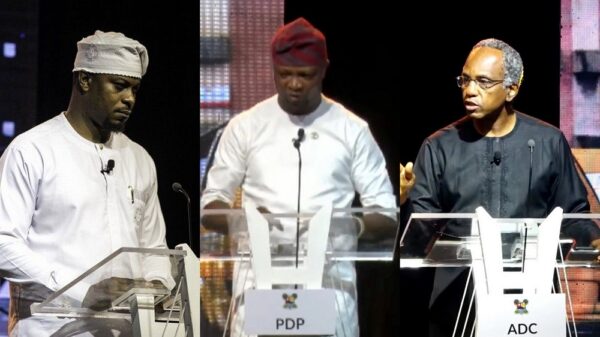
![]() However, Rhodes-Vivoue who stepped down for Jandor, has suddenly mustered confidence. Speaking in an interview earlier this week, the LP candidate asked the PDP to collapse its structure for him.
However, Rhodes-Vivoue who stepped down for Jandor, has suddenly mustered confidence. Speaking in an interview earlier this week, the LP candidate asked the PDP to collapse its structure for him.
“I have a relationship with the PDP. I came from the PDP. I was in the PDP for six years. I was the senatorial candidate for PDP in 2019. I had the most votes in the party. I know the leaders in the party. We understand that at a practical level, we need to have as many people working together, especially because this election process is not free and fair.
“They promised us electronic transmission of votes, that did not happen. We saw the intimidation and harassment, and manipulations at the ward collation, LG collation. So we need everybody to work together to save and rescue Lagos. We are in talks with several parties. A few parties have collapsed their structures for us. I expect that the PDP would do the same very soon.”
CAN RHODES-VIVOUR DEFEAT SANWO-OLU?
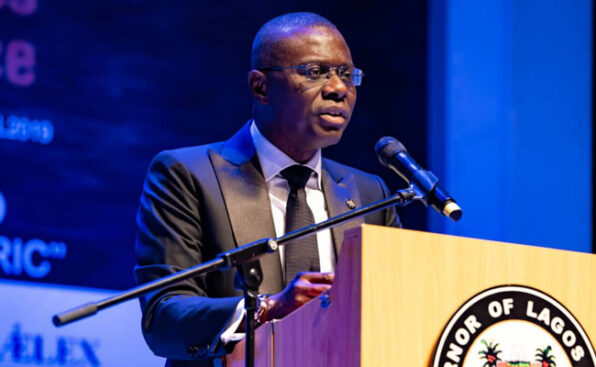
A few days to the election, all eyes are on the state while observers watch keenly with bated breath if the February 25 would repeat itself. Will Obidient sentiment replay itself on March 18?
This is the harbinger of the apprehension especially in the ruling party as the campaign has taken an ethnic dimension amidst claim that Gbadebo is not from Lagos.
This was why the Lagos Indigenes’ Congress (Igbimo Omo Eko), a network of Lagos bonafide indigenes across Lagos, affirmed that he “is a bonafide son of a reputable Lagos Island family and cannot be wished away because of maternal lineage as there is no individual that does not have both paternal and maternal lineages.”
An Associate Professor of Political Science, Kayode Esuola however believes that “what is at stake in Lagos now will not be the same as we had in the February 25 election.
“In February 25th election, national agenda was the focus, getting tired of the established political system was the focus and protest against gerontocracy. This time ethnic nationality will come in especially because after the February 25th election, the Obi movement was portrayed somehow as an Igbo movement.
“Any action or inaction that tends to be against the Obi movement was termed as anti-Igbo and so it will not be surprising if many people would have got that signal and now want to ‘de-igbonise’ the Obi idea by re-aligning into their ethnic nationality or religion as the case may be.”
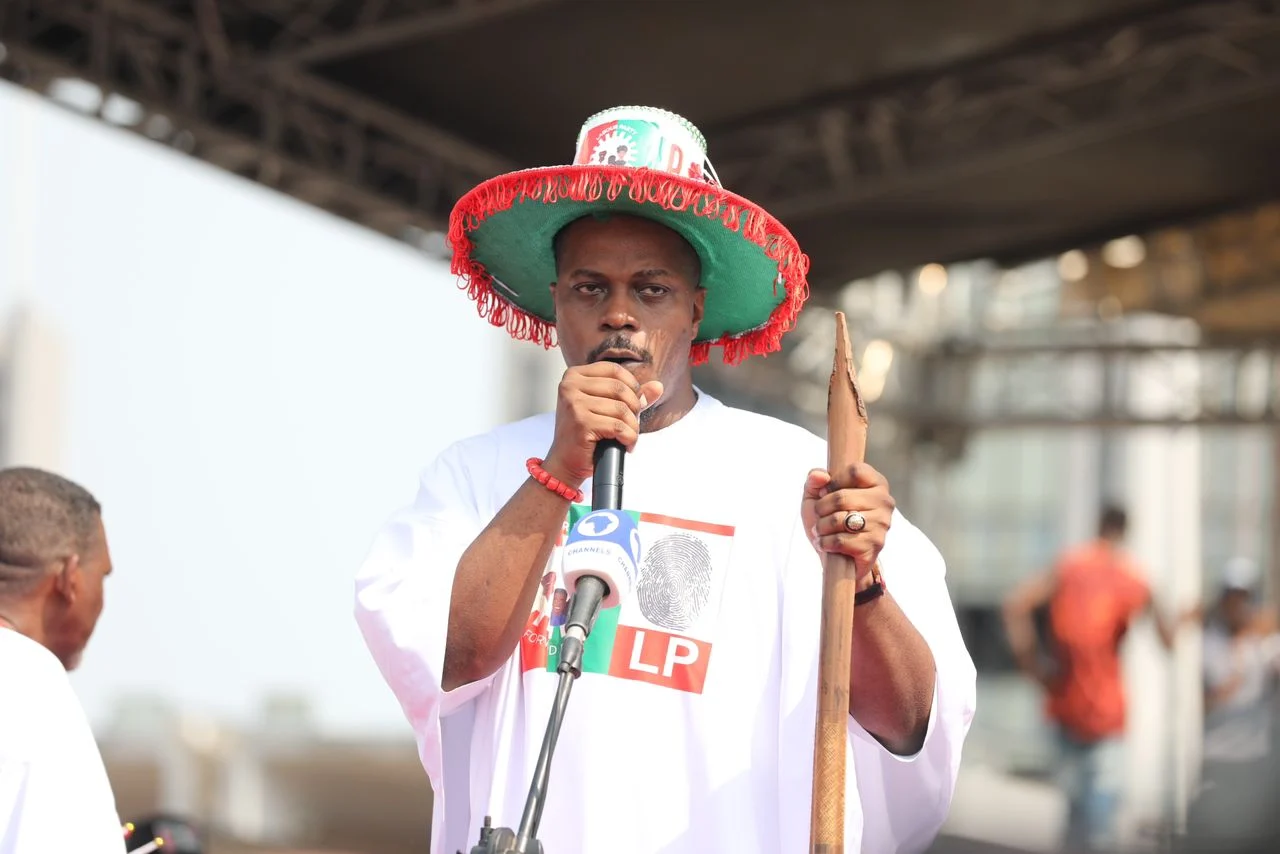
 Join Daily Trust WhatsApp Community For Quick Access To News and Happenings Around You.
Join Daily Trust WhatsApp Community For Quick Access To News and Happenings Around You.


